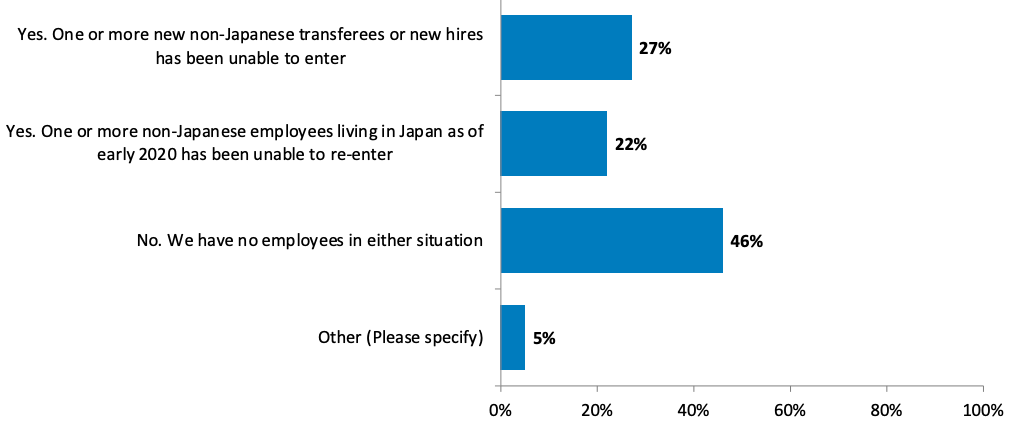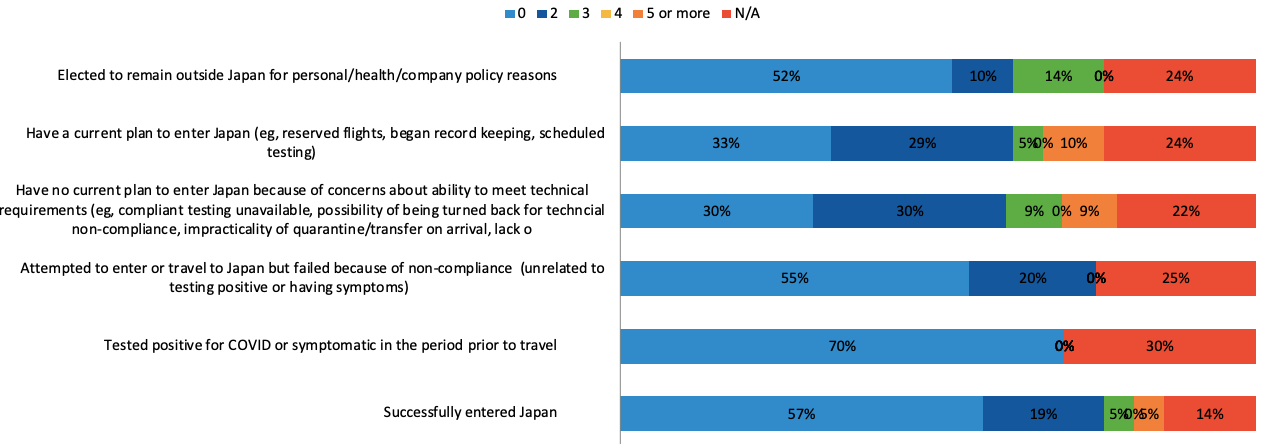Impact of Japan’s Travel Restrictions on Non-Japanese Employees and Dependents
RESULTS OF THE 8th ACCJ COVID-19 MEMBER SURVEY (OCT 12 — 16, 2020)
HALF OF RESPONDENTS SAY THAT EMPLOYEES AND DEPENDENTS ARE IMPACTED BY RESTRICTIONS
Our latest survey highlights how the foreign national employees and their dependents of ACCJ member companies are significantly impacted by the travel restrictions imposed by the Japanese government.
Many respondents report that the policies have placed burdens on their business, and have caused issues with client services, staffing, and management. The policies are restricting employees from conducting necessary business trips due to the quarantine requirements and difficult hurdles in arriving back to Japan. Many mentioned that the restrictions have prevented new employees from starting their positions and relocating to Japan. There is also stress on current employees unable to visit family abroad for important occasions. Companies are limited in their hiring and have seen relationships with clients abroad suffer as well. As a result, some members note that the original restrictions and the still cumbersome improvements may deter future investment decisions in Japan.
Does your company have non-Japanese employees or dependents who have been unable to enter Japan (for new transferees or new hires) or to re-enter Japan (for those living in Japan as of early 2020) following the imposition of travel restrictions?
For those responding YES to previous question, how many employees and dependents are in each category?
Is there anything else you would like for the ACCJ to know about your business situation related to Japan's Travel restrictions?
“The current entry requirements are very cumbersome. One of our employees who travelled outside Japan on business had to spend 4.5 hours at Haneda to complete the paperwork procedures on return. Very intrusive.”
“The policies have restricted our clients from coming to Japan. Many are coming from Asian countries which have lower COVID-19 infection rates (on a per-capita basis) than Japan. PCR test requirements (before departing for Japan) are still prohibitive.”
“Fluidity of rules creates a great deal of unnecessary work and rework in getting them here.”
“Our international suppliers are still unable to visit Japan complicating our ability to grow the market for their products and services.”
“In addition to business challenges in a market where face to face communications remain important, the stresses on non-Japanese staff who have remained in Japan and who have been unable to visit aging parents and families also needs to be taken into account.”
“The restrictions are impacting the ability of our US citizen employees to leave Japan on business and return. Both the 72-hour testing/certification requirement and the quarantine requirement make this impractical.”
“Foreign employees have not been able to take their normal home leaves over the summer to visit aging parents, etc.”
“Japan's travel restrictions make it impossible for our Japan-based, non-Japanese consultants to deliver client service outside of Japan. For example, we have clients in China who are asking us to deliver services in person. As a result, we are experiencing client service, staffing and internal management issues.“
“Limitations preventing new business visa transferees from taking up residence in Japan is placing a severe burden on our business and is a strong reason for not planning any further investment in Japan in the foreseeable future.”
“The Quarantine requirement should be dropped not only for returning residents but for visitors with a negative PCR test result.”
“We appreciate ACCJ's advocacy on behalf of this issue, which was/is of crucial importance to our company and the broader international business community in Japan.”
“We need the Japanese govt to approve business travelers (who do not have residency in Japan) ASAP.”
“Look forward to immigration changes making business travel feasible, though not sure how soon my organization will actually resume travel.”
“The significance of the restrictions on foreigners vs non Japanese has significantly reduced trust in Japan and the incentive to invest time and funds here long term.”
“Several of our non-Japanese employees have faced the choice of going “home” to see sick relatives, attend funerals or weddings, and being denied reentry into Japan. This is an untenable situation.”
“We have restricted consideration for hiring for our Japanese operations to individuals physically located in Japan right now. In the past, that would have only been a preference, but for now it is a requirement.”
“We had one associate on secondment to Singapore who had a difficult time returning to Japan but eventually was able to do so. The current restrictions on travel (particularly the two week quarantine on arrival and tracing app) have meant no foreign business travel by our clients or our people from overseas. Meetings are all held by Zoom, Team or Skype.”
“Most of our clients are overseas. Maintaining relations with current clients and developing new clients has depended on face to face meetings. The closed borders have dramatically impacted our ability to maintain client relations. This year we have been lucky to have had some good business, but Japan's Travel Restrictions have sent a terrible message to the world about Japan's lack of serious interest in international business and crossborder investments.”
“We have over 100 students from overseas (predominantly from the U.S.) who are waiting to enter the country or who will be entering shortly. Although we are holding in-person classes… these students have been forced to take courses online. We are encouraged that the Japanese government has taken the additional step of announcing that foreign students will be accepted into Japan. However, we are concerned that the students' arrival may be delayed due to the limitations being place on entries….”


